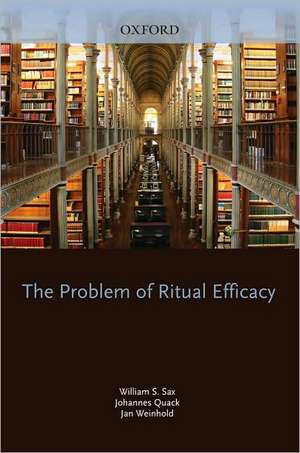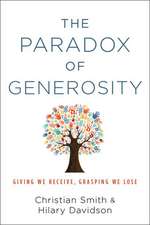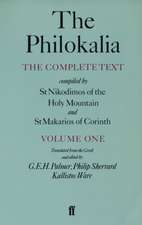The Problem of Ritual Efficacy: Oxford Ritual Studies Series
Editat de William Sax, Johannes Quack, Jan Weinholden Limba Engleză Paperback – 18 feb 2010
| Toate formatele și edițiile | Preț | Express |
|---|---|---|
| Paperback (1) | 264.38 lei 31-37 zile | |
| Oxford University Press – 18 feb 2010 | 264.38 lei 31-37 zile | |
| Hardback (1) | 357.33 lei 31-37 zile | |
| Oxford University Press – 25 feb 2010 | 357.33 lei 31-37 zile |
Din seria Oxford Ritual Studies Series
- 14%
 Preț: 341.05 lei
Preț: 341.05 lei -
 Preț: 425.22 lei
Preț: 425.22 lei - 13%
 Preț: 320.44 lei
Preț: 320.44 lei - 10%
 Preț: 267.71 lei
Preț: 267.71 lei - 8%
 Preț: 304.02 lei
Preț: 304.02 lei - 10%
 Preț: 250.25 lei
Preț: 250.25 lei - 23%
 Preț: 176.37 lei
Preț: 176.37 lei - 8%
 Preț: 299.01 lei
Preț: 299.01 lei - 15%
 Preț: 319.95 lei
Preț: 319.95 lei -
 Preț: 308.92 lei
Preț: 308.92 lei - 9%
 Preț: 281.21 lei
Preț: 281.21 lei - 14%
 Preț: 190.06 lei
Preț: 190.06 lei -
 Preț: 343.76 lei
Preț: 343.76 lei - 8%
 Preț: 301.16 lei
Preț: 301.16 lei - 25%
 Preț: 587.72 lei
Preț: 587.72 lei - 6%
 Preț: 225.52 lei
Preț: 225.52 lei
Preț: 264.38 lei
Preț vechi: 294.67 lei
-10% Nou
Puncte Express: 397
Preț estimativ în valută:
50.60€ • 52.15$ • 42.72£
50.60€ • 52.15$ • 42.72£
Carte tipărită la comandă
Livrare economică 20-26 februarie
Preluare comenzi: 021 569.72.76
Specificații
ISBN-13: 9780195394412
ISBN-10: 0195394410
Pagini: 208
Dimensiuni: 231 x 155 x 13 mm
Greutate: 0.3 kg
Editura: Oxford University Press
Colecția OUP USA
Seria Oxford Ritual Studies Series
Locul publicării:New York, United States
ISBN-10: 0195394410
Pagini: 208
Dimensiuni: 231 x 155 x 13 mm
Greutate: 0.3 kg
Editura: Oxford University Press
Colecția OUP USA
Seria Oxford Ritual Studies Series
Locul publicării:New York, United States
Recenzii
This collection of essays addresses the knotty and important problem of the efficacy of ritual from a variety of perspectives spanning the disciplines of anthropology and theology. Thematically focused and substantively rich, the volume will have considerable appeal to scholars and students in the fields of anthropology of religion, history of religions, ritual studies, and theology.
...no reader of Magic, Ritual, and Witchcreaft is likely to regret the purchase of this engaging and valuable book.
...no reader of Magic, Ritual, and Witchcreaft is likely to regret the purchase of this engaging and valuable book.
Notă biografică
William S. Sax is Professor of Anthropology, South Asia Institute, University of Heidelberg Jan Weinhold is research psychologist, Collaborative Research Centre Dynamics of Ritual (SFB 619 Ritualdynamik), Institute of Medical Psychology, University of Heidelberg.Johannes Quack is lecturer of Religious Studies and Anthropology, South Asia Institute, University of Heidelberg.Paul Töbelmann, Research Assistant, Historical Seminar, University of Heidelberg.













